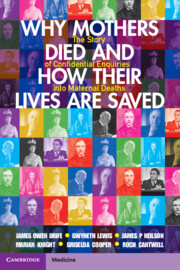 Why Mothers Died and How their Lives are Saved
Why Mothers Died and How their Lives are Saved Book contents
- Why Mothers Died and How Their Lives Are Saved
- Why Mothers Died and How Their Lives Are Saved
- Copyright page
- Contents
- Contributors
- Foreword
- Foreword
- Introduction
- 1 Historical Background
- 2 THE FIRST STEPS: 1900–1939
- 3 How the Confidential Enquiries Evolved
- 4 THE MISSING CHAPTER? PROLONGED LABOUR AND OBSTETRIC TRAUMA
- 5 HOW THE CHANGE BEGAN: THE STORY OF SEPSIS
- 6 Haemorrhage Then and Now
- 7 HYPERTENSION: ENQUIRIES, TRIALS AND RECOMMENDATIONS
- 8 The Story of Abortion
- 9 CHALLENGING TRADITION: THE STORY OF EMBOLISM
- 10 Pregnancy and Illness
- 11 Maternal Death due to Anaesthesia
- 12 Psychiatric Illness
- 13 THE MOTHERS WHO DIED: SOCIAL DETERMINANTS OF MATERNAL HEALTH
- 14 THE LEGACY IN THE UNITED KINGDOM: THE CONCEPT OF ‘NEAR MISS’ AND THE NEED TO KEEP SAVING LIVES
- 15 International Maternal Health: Global Action
- 16 International Action: Personal Views
- Figure Permissions
- Further Reading
- Index
6 - Haemorrhage Then and Now
Published online by Cambridge University Press: 05 April 2023
- Why Mothers Died and How Their Lives Are Saved
- Why Mothers Died and How Their Lives Are Saved
- Copyright page
- Contents
- Contributors
- Foreword
- Foreword
- Introduction
- 1 Historical Background
- 2 THE FIRST STEPS: 1900–1939
- 3 How the Confidential Enquiries Evolved
- 4 THE MISSING CHAPTER? PROLONGED LABOUR AND OBSTETRIC TRAUMA
- 5 HOW THE CHANGE BEGAN: THE STORY OF SEPSIS
- 6 Haemorrhage Then and Now
- 7 HYPERTENSION: ENQUIRIES, TRIALS AND RECOMMENDATIONS
- 8 The Story of Abortion
- 9 CHALLENGING TRADITION: THE STORY OF EMBOLISM
- 10 Pregnancy and Illness
- 11 Maternal Death due to Anaesthesia
- 12 Psychiatric Illness
- 13 THE MOTHERS WHO DIED: SOCIAL DETERMINANTS OF MATERNAL HEALTH
- 14 THE LEGACY IN THE UNITED KINGDOM: THE CONCEPT OF ‘NEAR MISS’ AND THE NEED TO KEEP SAVING LIVES
- 15 International Maternal Health: Global Action
- 16 International Action: Personal Views
- Figure Permissions
- Further Reading
- Index
Summary
Haemorrhage is the leading global cause of maternal death. In the 1930s transfusion services were established in British cities, followed in 1946 by a national blood transfusion service. Drugs to cause uterine contraction were developed: ergometrine in the 1930s and oxytocin in the 1950s. In the 1930s obstetric flying squads were established, first in Bellshill and Newcastle, and in Birmingham by Hilda Lloyd, the first female RCOG president. They saved many lives but disappeared as home births fell. In the 1950s iron supplements were introduced into antenatal care to combat pre-existing anaemia. CEMD Reports highlighted the risk of vaginal examination in pregnancy. In the 1970s placental localisation by ultrasound became available. The Reports pointed out that intractable bleeding may need hysterectomy and the 1979-81 Report included the first guideline on emergency treatment of haemorrhage. Guidelines remain essential today, for example in planning care for women who refuse blood transfusion. Ectopic pregnancy can cause catastrophic bleeding in early pregnancy. The Reports showed that ethnic minorities are at higher risk and immediate surgery can be life-saving.
Keywords
- Type
- Chapter
- Information
- Why Mothers Died and How their Lives are SavedThe Story of Confidential Enquiries into Maternal Deaths, pp. 80 - 88Publisher: Cambridge University PressPrint publication year: 2023
